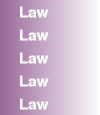 NOTE: The following news brief appeared in an issue of the Reference Service, Advertising Compliance Service and examined an advertising law-related action during the month of August 1996.
NOTE: The following news brief appeared in an issue of the Reference Service, Advertising Compliance Service and examined an advertising law-related action during the month of August 1996.
FTC AGREEMENT: INTERNET PROMOTER
BANNED FROM BUSINESS FOR LIFE
Advertisers that are not aware of the myriad laws, rules, regulations and administrative decisions affecting their advertising practices are playing a perilous game. A recent Federal Trade Commission (FTC) case illustrates just how perilous that can be--
An Internet promoter is out of the advance fee credit business forever,
under an agreement he signed to settle FTC charges against him. FTC
charged that he allegedly bolstered his promises of easy credit for
consumers by claiming he had an "excellent record" with the "National
Bureau of Consumer Affairs." FTC charged that the National Bureau of
Consumer Affairs was one of the names under which the promoter
conducted his South Carolina-based fraudulent credit services business.
The settlement negotiated by FTC also requires the promoter to pay
$3,500 in consumer redress, bars him from violating the Telemarketing
Sales Rules' provisions against deceptive or abusive telemarketing
practices, and imposes a broad ban on material misrepresentations in
connection with any product or service he sells in the future.
FTC's complaint alleged that the promoter advertised VISA cards and
loans with "no credit check" on the Internet and in many publications,
including Income Opportunities and the National Enquirer, and charged
an advance fee of $49. What consumers actually got for their money was
a list of companies offering loans (for which consumers had to
qualify), along with various self-help credit-related materials, said
the agency.
NOTE: This consent judgment is for settlement purposes only and does not
constitute an admission by the defendant of a law violation. Consent
judgments have the force of law when signed by the judge.
(National Bureau of Consumer Affairs et al., FTC File No. X96 0070,
Civil Action No. 2 96 1675 18, August 13, 1996; materials relating to
this FTC matter are available on the Internet at FTC's World Wide Web
site at: http://www.ftc.gov.)
© Copyright 1998-2008 JLCom Publishing Co., LLC All rights reserved. This publication, in whole or in part, may not be reproduced, stored in a computerized, or other, retrieval system, or transmitted in any form or by any means whatsoever without the prior written permission of JLCom Publishing Co., LLC
IMPORTANT NOTICE: The Materials included in this Web Site are intended for general information purposes only and are not intended to provide - and do not constitute - legal or other advice. Persons who need legal or other services should contact a duly licensed professional. Inclusion of links on this Web Site are to Web Sites maintained by third parties over whom JLCom Publishing Co., LLC has no control. Such links do not imply endorsement of the material that's contained therein. JLCom Publishing Co., LLC makes no claims, representations or warranties as to the accuracy, completeness or appropriateness of these Web Sites or the information these websites contain. Read this disclaimer and our privacy statement before using this site.



